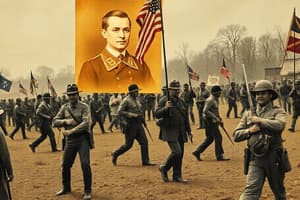Podcast
Questions and Answers
What was the goal of the Union in capturing and destroying Atlanta?
What was the goal of the Union in capturing and destroying Atlanta?
The goal of capturing and destroying Atlanta was important to the Union because Atlanta was an industrial center and railroad hub of the Confederacy.
What was the name of General Winfield Scott's plan to 'squeeze the Confederacy to death'?
What was the name of General Winfield Scott's plan to 'squeeze the Confederacy to death'?
- The Gettysburg Address
- Sherman's March to the Sea
- The Emancipation Proclamation
- The Anaconda Plan (correct)
What was the most notorious site's name of the Civil War?
What was the most notorious site's name of the Civil War?
- Gettysburg
- Chickamauga
- Savannah
- Andersonville (correct)
What happened on September 2, 1864?
What happened on September 2, 1864?
How was the Emancipation Proclamation received by the South?
How was the Emancipation Proclamation received by the South?
What was the Union's goal in Georgia during the first two years of the Civil War?
What was the Union's goal in Georgia during the first two years of the Civil War?
The Battle of Chickamauga was a significant Union victory.
The Battle of Chickamauga was a significant Union victory.
The Emancipation Proclamation freed all slaves in the United States.
The Emancipation Proclamation freed all slaves in the United States.
What was the key turning point of the Civil War? Choose the best answer.
What was the key turning point of the Civil War? Choose the best answer.
What was Sherman's strategic goal during his 'March to the Sea'?
What was Sherman's strategic goal during his 'March to the Sea'?
Who captured the city of Savannah and presented it to Abraham Lincoln as a Christmas gift?
Who captured the city of Savannah and presented it to Abraham Lincoln as a Christmas gift?
Where did General Lee surrender to General Grant, ending the Civil War?
Where did General Lee surrender to General Grant, ending the Civil War?
What are some of the reasons why the Confederacy lacked resources to sustain the Civil War?
What are some of the reasons why the Confederacy lacked resources to sustain the Civil War?
Flashcards
War Resources
War Resources
The ability of a nation to wage war successfully, including resources like soldiers, money, food, weapons, and transportation.
American Civil War
American Civil War
The period of time between 1861 and 1865 when the United States was divided into the Union and Confederate States, resulting in a bloody conflict.
Confederate States of America
Confederate States of America
The states that seceded from the Union and formed their own government.
Union
Union
Signup and view all the flashcards
Lincoln's Election
Lincoln's Election
Signup and view all the flashcards
Southern Fears About Slavery
Southern Fears About Slavery
Signup and view all the flashcards
Confederate Government
Confederate Government
Signup and view all the flashcards
Lincoln's Goal
Lincoln's Goal
Signup and view all the flashcards
Lincoln's Slavery Stance
Lincoln's Slavery Stance
Signup and view all the flashcards
Start of the Civil War
Start of the Civil War
Signup and view all the flashcards
Fort Sumter
Fort Sumter
Signup and view all the flashcards
Anaconda Plan
Anaconda Plan
Signup and view all the flashcards
Union Blockade
Union Blockade
Signup and view all the flashcards
Blockade Runners
Blockade Runners
Signup and view all the flashcards
Fort Pulaski
Fort Pulaski
Signup and view all the flashcards
Battle of Antietam
Battle of Antietam
Signup and view all the flashcards
Emancipation Proclamation
Emancipation Proclamation
Signup and view all the flashcards
Emancipation
Emancipation
Signup and view all the flashcards
13th Amendment
13th Amendment
Signup and view all the flashcards
African Americans in the Union Army
African Americans in the Union Army
Signup and view all the flashcards
Battle of Gettysburg
Battle of Gettysburg
Signup and view all the flashcards
Lee's Invasion of the North
Lee's Invasion of the North
Signup and view all the flashcards
Battle of Chickamauga
Battle of Chickamauga
Signup and view all the flashcards
Sherman's Atlanta Campaign
Sherman's Atlanta Campaign
Signup and view all the flashcards
Capture of Atlanta
Capture of Atlanta
Signup and view all the flashcards
Sherman's March to the Sea
Sherman's March to the Sea
Signup and view all the flashcards
Andersonville Prison
Andersonville Prison
Signup and view all the flashcards
Surrender at Appomattox
Surrender at Appomattox
Signup and view all the flashcards
Civil War Casualties
Civil War Casualties
Signup and view all the flashcards
Study Notes
Georgia's Role in the Civil War
- Georgia played a significant role in the American Civil War, experiencing various battles and military campaigns.
- Georgia's strategic location as a transportation hub made it a target for Union forces.
- The state also had a prominent Confederate presence throughout the conflict.
- Important battles fought in or near Georgia include: Chickamauga, which was a major Confederate victory and the second deadliest battle of the Civil War.
- Other significant events include Sherman's March to the Sea, a devastating campaign to cripple the South's ability to continue the war, targeting Atlanta as an industrial center and railroad hub, and destroying the city.
- This led to widespread destruction in parts of Georgia.
- The Confederate prison camp at Andersonville, Georgia, became infamous for its appalling conditions.
- Overcrowding and a lack of essential resources led to the deaths of thousands of Union prisoners.
- The war's end resulted in a significant loss of life and considerable damage to infrastructure.
- The Civil War ended in April 1865 with the Confederate surrender to Union forces.
- The Union victory ultimately preserved the United States as a single nation.
Economic Context of the War
- Both sides of the conflict required significant resources to sustain their war efforts.
- The North (Union) had a stronger economy and larger population.
- Key economic advantages that benefited the North included a greater number of factories, a large amount of manufacturing capacity, and greater financial resources in comparison to the Confederacy.
- The South had strengths in cotton production, which was a vital commodity at the time.
- The economies on both sides of the war were greatly impacted.
Comparing the Union and the Confederacy
- The North had a greater population, a stronger economy, a more powerful navy, and a better transportation system compared to the South.
- Though initially the Confederacy had skilled military leaders, who were experienced from the Mexican War, the Union grew in strength as the war wore on.
- Both sides had significant military leaders: The Union army under Ulysses S. Grant and William T. Sherman, and the Confederate army under Robert E. Lee.
- The Union had better logistics, including a larger railroad network and better access to supplies.
Lincoln and the Confederacy
- Abraham Lincoln's election in 1860 led to the secession of seven Southern states from the Union.
- Southerners feared Lincoln's stance against the expansion of slavery would threaten their way of life.
- The Southern states formed the Confederate States of America.
- Lincoln's inaugural address attempted to preserve the Union. He stated his intention not to interfere with slavery where it already existed, however the Confederacy did not consider this to be enough and hostilities began.
Fort Sumter
- Fort Sumter was a Union fort in Charleston Harbor, South Carolina.
- The Confederate attack on Fort Sumter in April 1861 marked the beginning of the Civil War.
- Inside the fort were Union troops, who were running low on provisions, and eventually surrendered.
Blockade
- The Union implemented a naval blockade of Southern ports to cripple the Confederacy's economy.
- This aimed at preventing the South from exporting cotton and importing necessary supplies.
- The Union would not allow Confederate ships from entering or exiting the Southern ports.
- Blockade runners, however, were able to evade the blockade occasionally which was a persistent challenge during the Civil War.
Anaconda Plan and its Goals
- The Anaconda Plan was a Union strategy to win the Civil War.
- It involved a blockade of Southern ports, control of the Mississippi River, and capturing major Confederate cities to weaken the Confederate forces.
- The Union's plan involved squeezing the Confederacy like a snake.
Emancipation Proclamation
- The Emancipation Proclamation, issued by President Lincoln in 1862, declared slaves in Confederate-held territory free.
- It significantly shifted public sentiment in the Union and abroad.
- The plan ultimately helped secure the Union victory and lead the way towards ending slavery in the United States.
Battle of Gettysburg
- The Battle of Gettysburg, fought in Pennsylvania in 1863, was a significant Union victory.
- This battle was the bloodiest battle in the Civil War, leading to Confederate General Lee's abandonment of his offensive into the North.
Atlanta Campaign
- General William T. Sherman's Atlanta Campaign in 1864 targeted the important Confederate city of Atlanta, which served as a crucial transportation hub and industrial center.
- The campaign resulted in the capture of Atlanta, a devastating blow to the Confederacy.
Sherman's March to the Sea
- Sherman's March to the Sea in 1864 aimed to destroy Southern infrastructure and demoralize the Confederacy.
- The Union forces marched from Atlanta to Savannah, destroying railroads, crops, and infrastructure along the way, ultimately crippling the Confederate ability to sustain warfare.
Andersonville Prison
- Andersonville Prison in Georgia was a Confederate prison camp during the Civil War.
- The camp was notorious for its appalling conditions, including overcrowding, lack of food and water, and a high death toll.
- Over 13,000 prisoners died due to disease and starvation, resulting in one of the most tragic and notorious aspects of the war.
End of the Civil War
- The Confederacy surrendered to Union forces at Appomattox Court House in Virginia in 1865.
- The end of the war resulted in significant loss of life (620,000 to 850,000) on both sides, and led to long-term political and social change in the United States.
Studying That Suits You
Use AI to generate personalized quizzes and flashcards to suit your learning preferences.




